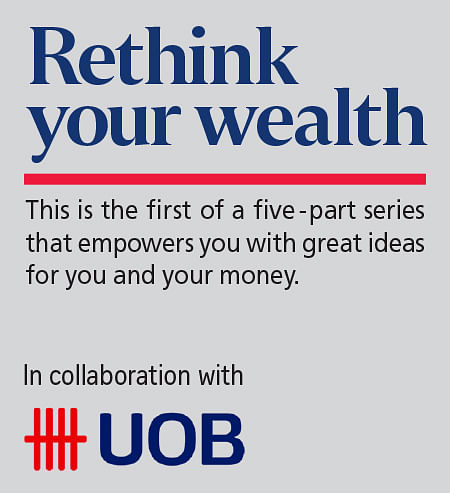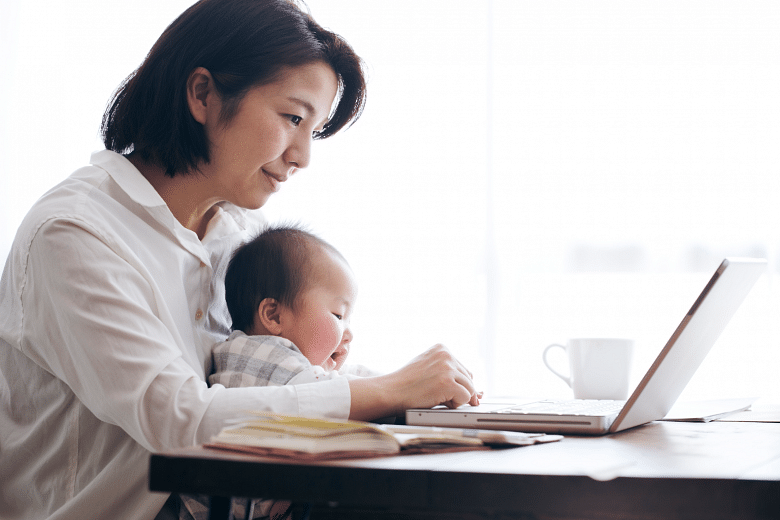Mothers have had to juggle more as Covid-19 dramatically upends the way we live and work. Job uncertainties aside, these women face growing responsibilities at home amid work-from-home arrangements and can struggle with the lack of childcare services.
The current climate has made it more necessary than ever to plan for unforeseen circumstances. "For mothers, this is of utmost importance because they would want to protect their families' well-being without sacrificing their own," said Ms Jacquelyn Tan, UOB head of group personal financial services.
Mothers must think with care about how their financial needs will shift throughout the different stages of their lives, beginning from the time their children are born.
And as their children grow older, right to the point of starting their own families, mothers must also keep their retirement needs in mind through those years.
As women are expected to outlive men, retirement planning is a task that cannot be overlooked. Studies have also shown that women are more likely to be the primary caregiver to their children, even as the gender wage gap persists.
In Singapore, women, including mothers, have been paying increasing attention to their finances. A recent survey outlined the top financial goals that women have and the active steps taken to reach their goals.
Mothers between ages 30 to 39 - who prioritise the stability of their family and children - have three main financial objectives: to ensure a stable family life in future, appreciate assets to beat future inflation, and to finance their children's or grandchildren's education, according to an RFi Research survey commissioned by UOB.
Those above 40, meanwhile, have additional goals to maintain their current lifestyle, retire early and own their own home.
"The pandemic has forced us to confront how unpredictable the future can be and how we need to actively take steps to achieve the goals we aspire towards. Fortunately, mothers are no strangers to looking ahead and taking a long-term view of their finances," said Ms Tan.
Prudent savers
Motherhood can be an expensive journey. As such, mothers tend to make more prudent savers, as they value stability in their family life and prioritise safeguarding their loved ones' needs, said Ms Tan.
Women are increasingly setting aside more money for rainy days. UOB's female customer base on average doubled the amount of savings they grew in 2020, compared to the previous year.
Ms Theresa See, a mother of two children, both in their 20s, started to pay greater attention to how she manages her finances after becoming a mother.
As a general rule of thumb, one should shore up between three to six months of their monthly living expenses in emergency funds.
"Having more rainy-day funds stashed away hopefully puts mothers in a better position to handle any curveballs that life might throw at them," said Ms Tan.
Getting insured
Insurance is another key building block for a sound financial foundation. Mothers have a primary role to provide for all of their children's needs, which include a financial safety net to buffer against unforeseen circumstances.
This makes mothers more likely to take steps to ensure they and their families are covered by insurance. Among UOB customers, women account for almost two-thirds of the insurance policies purchased.
The RFi Research survey further found that the majority of mothers between ages 30 to 39 hold more than four banking products. More than nine in 10 have insurance products, while more than eight in 10 hold investment products.
Likewise, the bulk of mothers above 40 surveyed also hold four or more banking products. Within the group, all of them own insurance, while over nine in 10 hold investment products.
Ms See purchased her first insurance plan shortly after graduating university. Back then, a monthly premium of $120 for a life insurance plan was "no small sum for me", she recalled.

In hindsight, getting insured early was a financial commitment that could not be skimped on, said Ms See. Over the years, she has acquired more life, health, wealth accumulation, home, personal accident, and travel insurance for herself as well as her children.
"Protecting themselves and their loved ones from the unexpected and safeguarding their financial future is clearly something mothers do not take lightly," said Ms Tan, adding that the findings are encouraging and consistent with how UOB advises its customers to manage their wealth.
"We focus on first safeguarding the hard-earned wealth they have accumulated, helping them protect themselves and those close to their hearts, before recommending ways to grow their wealth. This 'risk-first' approach helps them manage risks so they are better positioned to achieve their financial goals."
To empower women to protect themselves so they can better care for their families, UOB launched the Lady's Savings Account last year - the only savings account in Singapore that provides women with complimentary coverage of up to $200,000 for six female cancers based on their savings.
Growing their wealth
For mothers, investments are essential not only to beat inflation, but also to fund long-term goals such as buying a house, paying for children's education and retirement.
And invest they did - more actively as compared to men. Women are more likely than men to be investors and accounted for about three of five UOB customers who purchased unit trusts last year.
As an example, Ms See initially invested a portion of her savings into unit trusts. Some of these investments were capital-protected with fixed dividend payouts, while others were for capital appreciation.
Over time, her investment portfolio has expanded to consist of a mix of equities, fixed income and multi-asset income funds with a focus on megatrends such as healthcare and sustainability.
Amid far-reaching Covid-19 repercussions and rising climate concerns, women have also started to embrace sustainable investing.
This trend is especially apparent in younger women in their 20s and 30s. Their investment in environmental, social and governance (ESG) funds is also larger, compared to those who invest in non-ESG funds, UOB data showed.
"By putting their money towards causes that matter to them, they are making a difference to the world, even as they invest for their future," said Ms Tan.
Ms See started to incorporate sustainable investing into her portfolio last year. Previously, she would largely only consider the financial implications of her investments.
"However, over the last few years, through discussions with my client adviser, I came to realise that my investment decision not only has implications for my portfolio, but also for society as a whole," she said.
Some research suggests that investing for a greater cause can come with better returns.
S&P Global recently analysed 26 ESG exchange-traded funds and mutual funds with more than US$250 million in assets under management. From March 5, 2020 - the month that the World Health Organization officially declared Covid-19 a pandemic - to March 5 this year, 19 of those funds performed better than the S&P 500. Those outperformers rose between 27.3 per cent and 55 per cent, while the S&P 500 grew 27.1 per cent.
"A responsible investor should consider investing in companies that demonstrate strong sustainability credentials that deliver a positive social impact on the world, apart from generating good returns for the investor," said Ms See.
Natalie Choy is a journalist with The Business Times.

